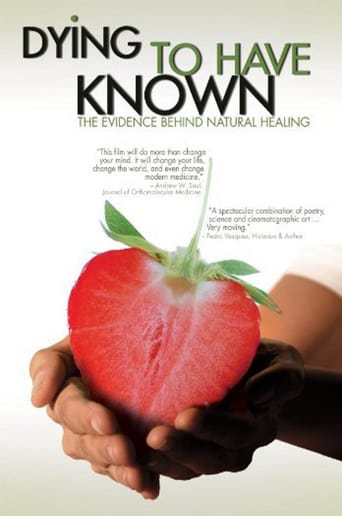Stometer
Save your money for something good and enjoyable
Phonearl
Good start, but then it gets ruined
PiraBit
if their story seems completely bonkers, almost like a feverish work of fiction, you ain't heard nothing yet.
Myron Clemons
A film of deceptively outspoken contemporary relevance, this is cinema at its most alert, alarming and alive.
j g
Gerson's therapy has not been independently tested or subjected to randomized controlled trials, and thus is illegal to market in the United States. The Gerson Institute promotes the therapy by citing patient testimonials and other anecdotal evidence. Gerson published a book discussing the alleged success of the therapy in 50 patients, but a review by the U.S. National Cancer Institute was unable to find any evidence that Gerson's claims were accurate. The NCI found that no in vivo animal studies had been conducted. Similarly, case series by Gerson Institute staff published in the alternative medical literature suffered from methodological flaws, and no independent entity has been able to reproduce the claims.Attempts to independently check the results of the therapy have been negative. A group of 13 patients sickened by elements of the Gerson Therapy were evaluated in hospitals in San Diego in the early 1980s; all 13 were found to still have active cancer. An investigation by Quackwatch found that the institute's claims of cure were based not on actual documentation of survival, but on "a combination of the doctor's estimate that the departing patient has a 'reasonable chance of surviving', plus feelings that the Institute staff have about the status of people who call in".A 1994 article in the Journal of Naturopathic Medicine attempted to follow 39 Gerson patients in Tijuana. Patient interviews were used to confirm the existence and stage of cancer; most patients were unaware of the stage of their tumor, and medical records were not available. Most patients were lost to follow-up; of the patients successfully followed, 10 died and six were alive at their last follow-up. Review of this study pointed out its "obvious flaws", including "the majority of patients lost to follow-up, lack of access to detailed medical records, and reliance upon patients for disease stage information"; the authors themselves regarded the results as unclear.The American Cancer Society reported that "there is no reliable scientific evidence that Gerson therapy is effective in treating cancer, and the principles behind it are not widely accepted by the medical community. It is not approved for use in the United States." In 1947, the National Cancer Institute reviewed 10 claimed cures submitted by Gerson; however, all of the patients were receiving standard anticancer treatment simultaneously, making it impossible to determine what effect, if any, was due to Gerson's therapy. A review of the Gerson Therapy by Memorial Sloan-Kettering Cancer Center concluded: "If proponents of such therapies wish them to be evaluated scientifically and considered valid adjuvant treatments, they must provide extensive records (more than simple survival rates) and conduct controlled, prospective studies as evidence". In 1959, the National Cancer Institute (NCI) again reviewed cases of patients treated by Gerson. The NCI found that the available information did not prove the regimen had benefit. Cancer Research UK states that "Available scientific evidence does not support any claims that Gerson therapy can treat cancer. Gerson therapy can be very harmful to your health."
Sonic_Master
It is hard to be objective when evidences starts to pile up and you're getting more and more angry, but he has somehow managed to stay true to the course and objectively approach every single goal he has set until the final one.Very nicely done, it is refreshing to see for a change a documentary in which facts are presented as they are, without bias toward either side and without director constantly trying to convey a single message to the point where it gets so annoying and you say "Al right i got it, i got it.. can i please see the rest.."I get the feeling that he was filming this movie for his own personal records, so that someday, in 20 years from now, he can lean back in his sofa with his wife and watch it in the evenings, and remember where we were once..Surely we will all watch it one day as a historical footage, while trying to explain our grandchildren how we had our reasons to let powerful people become what they are now...
Rudolf Penninkhof
I like this film because of the critical attitude. It's the first of three films Steve Kroschel has made about this Cure for Cancer called the 'Gerson Theraphy', and because it's the first, the subject is approached openly, and experts, patients and critics are consulted.This systematic approach documents the benefits and some of the hassles of the therapy very well, and forms an informing and entertaining documentary that can really open one's eyes and benefit those who are ill, be it from cancer or other chronic illnesses.. The footage is also often breathtaking, and this film is the first great example I've seen of how a documentary can be wonderful to watch as well as informing and inspiring for other activists fighting to spread the word about great news. Please watch this film and share it with your loved ones!
solarislux
In This documentary, Dying to Have Known, Steve Kroschel spends 52 days looking for evidence supporting the effectiveness of Gerson Therapy.He travels all over the world and get testimonies of doctors and scientists as well as real patients who assure us that this therapy is effective in curing cancer and other diseases. This documentary offers proof and hope.Th biggest question this documentary brings ups is why is Gersons Therapy being depressed? Is it possible that the medical industry doesn't want us to learn the truth because there simply is too much money to be made in the cancer industry!This film is very eye opening!

